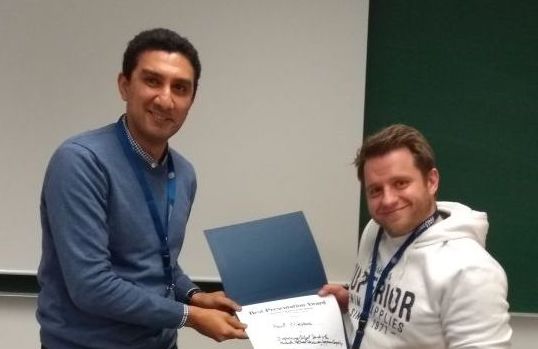 |
|
The network calculus has established as a versatile methodology for the queueing analysis of resource sharing based systems. Its prospect is that it can deal with problems that are fundamentally hard for alternative methodologies, based on the fact that it works with bounds rather than striving for exact solutions. The high modeling power of the network calculus has been transposed into several important applications for network engineering problems, traditionally in the Internet’s Quality of Service proposals IntServ and DiffServ, and more recently in diverse environments such as wireless sensor networks, switched Ethernets, or Systems-on-Chip.
The goal of this workshop is to bring together researchers with an interest in the theory of network calculus as well as those who want to apply existing results in new applications. The workshop will serve to promote the network calculus theory to researchers with an interest in applied queueing models for data communication.
Amr Rizk, TU Darmstadt, GER
Steffen Bondorf, National University of Singapore, SG
Kai-Steffen Jens Hielscher, FAU Erlangen, GER
Markus Fidler, Leibniz University Hannover, GER
Jens Schmitt, TU Kaiserslautern, GER
| 09:00 - 09:10 | Opening [slides] - Chair: Steffen |
| 09:10 - 11:00 | Session 1: "Outside the Box" - Chair: Amr |
| Jörg Liebeherr: Applications of the duality of min-plus and max-plus network calculus [slides] | |
| Sami Akin: A Method for Cross-layer Analysis of Transmit Buffer Delays in Message Index Domain [slides] | |
| Henrik Schiøler: An example based course curriculum for Performance Evaluation in Distributed Real Time Systems [slides] | |
| Fabien Geyer: Deterministic Network Calculus Analysis of Multicast Flows [slides] | |
| 11:00 - 11:20 | Coffee Break |
| 11:20 - 12:35 | Session 2: "Wireless Networks" - Chair: Markus |
| Fengyou Sun: A Statistical Property of Wireless Channel Capacity [slides] | |
| Jaya Prakash Champati: Transient Analysis for Wireless Networks [slides] | |
| Neda Petreska: Algorithms for Optimal Power Allocation of Wireless Multi-Hop Heterogeneous Networks under Statistical Delay Constraints [slides] | |
| 12:35 - 13:30 | Lunch Break |
| 13:30 - 15:05 | Session 3: "Output Bounds and Shaping" - Chair: Steffen |
| (MMB Paper Presentation) Steffen Bondorf, Paul Nikolaus, Jens Schmitt: Catching Corner Cases in Network Calculus – Flow Segregation Can Improve Accuracy [slides] | |
| Paul Nikolaus: Improving Output Bounds in the Stochastic Network Calculus Using Lyapunov’s Inequality [Best Presentation; slides] | |
| Jean-Yves Le Boudec: FIFO systems with interleaved regulators [slides] | |
| 15:05 - 15:30 | Coffee Break |
| 15:30 - 16:45 | Session 4: "DNC Applications" - Chair: Kai-Steffen |
| Marc Boyer: Computing Routes and Delay Bounds for the Network-on-Chip of the Kalray MPPA2 Processor [slides] | |
| Ahlem Mifdaoui: Buffer-Aware Worst-Case Timing Analysis of Wormhole NoCs Using Network Calculus [slides] | |
| Amaury Van Bemten: DetServ: Network Models for Real-Time QoS Provisioning in SDN-based Industrial Environments [slides] | |
| 16:45 - 17:00 | Best Presentation Award and Closing - Chair: Amr |
The idea is to have an informal meeting with presentations of recent work in the context of network calculus (theory, applications, tool support) and gather as many network calculus experts as possible to discuss about the future development of the theory and its application opportunities. Hence, there are no written papers and everyone can present his/her "hottest" recent research on network calculus.
If you like to present then please send an email to amr.rizk@kom.tu-darmstadt.de and bondorf@cs.uni-kl.de and kai-steffen.hielscher@fau.de with the following content
In case of contention, presentations will be selected based on novelty and topical coherence.
As in the previous edition, participants democratically elected the best presentation.
This year's award goes to Paul Nikolaus [talk, slides]. Congratulations!

Submission of presentation title and abstract: January 11, 2018 (passed)
Notification of invitation for presentation: January 18, 2018 (passed)
Workshop date: February 28, 2018 (passed)
The workshop is integrated into the MMB 2018 conference and we suggest to also take registering to this event into consideration, but a WoNeCa-only registration is also possible here.
The topics of this workshop are related to fundamental aspects as well as applications of network calculus. The following list of topics is non-exclusive:
|
Deterministic and stochastic network calculus, e.g.
|
Relation to other theories, e.g.,
|
|
|
Feedback systems, e.g.,
|
Loss systems, e.g.,
|
|
|
Aggregate multiplexing, e.g.,
|
Tool support, e.g.,
|
|
|
Data transformation, e.g.,
|
New applications, e.g.,
|
|